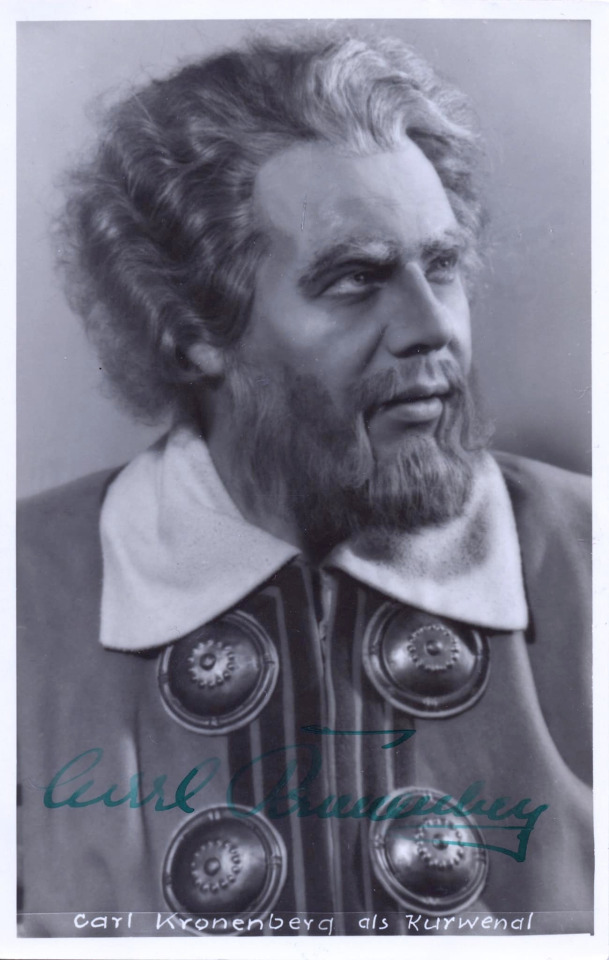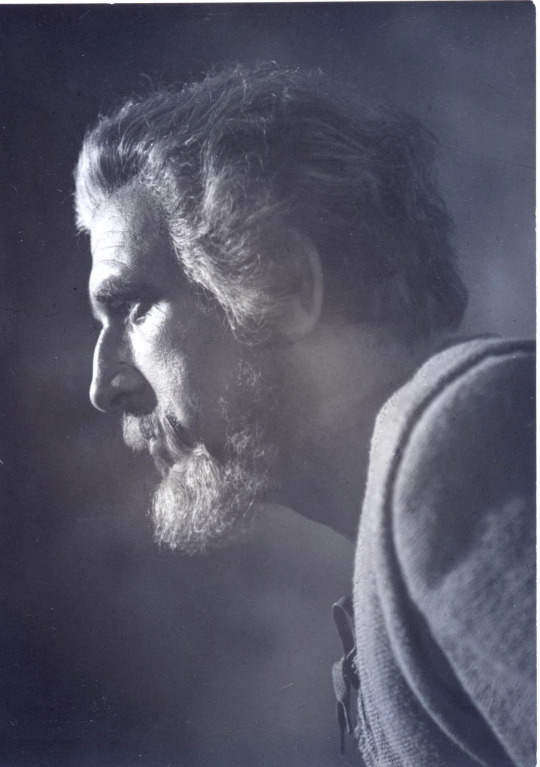#paul schöffler
Explore tagged Tumblr posts
Text


The German soprano Glanka Zwingenberg (1903-1951). After successful years as concert singer in Berlin she made her opera debut 1933 at the Opernhaus Essen, where she stayed till 1936. From 1936 till 1939 she sang at the Staatsoper Hamburg. When Karl Ellmendorff became general music director at the Nationaltheater Mannheim, he engaged the soprano. In Mannheim she sang Donna Anna, Marta („Tiefland“), Lady Macbeth, Elektra, Marschallin, Norma, Brünnhilde and Isolde. Guest performances took her to Rome (Senta in 1942 with Paul Schöffler as Holländer), Barcelona (Isolde, 1942) and Paris (Brünnhilde, 1941). In 1946, due to a worsening heart condition, she gave her farewell performance in Mannheim as Isolde and started teaching at the Mannheim Musikhochschule. She returned to the stage for some guest performances, in 1948, at the Städtische Oper Berlin, she sang her last Isolde. In 1951 with 48 years she died of a heart attack. The photographs show her as Brünnhilde with Josef Herrmann as Wotan in „Die Walküre“ at the Städtische Oper Berlin in 1948.
#opera#classical music#music history#bel canto#composer#classical composer#aria#classical studies#soprano#Glanka Zwingenberg#Zwingenberg#Die Walküre#Josef Herrmann#Herrmann#baritone#Richard Wagner#Wagner#classical history#chest voice#classical singer#classical singing#opera history#opera singer#diva#maestro#prima donna#classical composers#classical musician#classical musicians#musician
5 notes
·
View notes
Video
youtube
PAUL SCHÖFFLER - Wotans Abschied und Feuerzauber
1 note
·
View note
Photo






El día que murió Franco nos pusimos todos muy contentos, porque esa mañana nos quedamos jugando en la calle.
#beethoven#chor und orchester der wiener staatsoper#karl böhm#wilhelm furtwängler#tomislav neralic#paul schöffler#torsten ralf#hilde konetzni#herbert alsen#irmgard seefried#peter klein#hermann gallos#hans scweiger#alfred poell#otto edelmann#wolfgang windgassen#martha mödl#gottlob frick#sena jurinac#rudolf schock#alwin hendriks#franz bierbach#andante#música#music#mis discos
1 note
·
View note
Text
0 notes
Video
youtube
'Es gibt derer, die bleinem immer gelassen' from "Die Frau ohne Schatten" Barak : Paul Schöffler Die Färberin : Christel Goltz Wiener Philharmoniker Conducted by Karl Böhm Wien 1955
(por Addiobelpassato )
(May.16)
#christel goltz#my operasingers diary#die frau ohne schatten#paul schöffler#wiener philharmoniker#karl böhm
3 notes
·
View notes
Text











On June 10, 1865, the world premiere of "Tristan and Isolde" by R. Wagner took place in Munich.
„Tristan! Trauter! Schilt mich nicht, dass der Treue auch mit kommt!…“
Here are some of the first baritones to have sung the role of Kurwenal over the years and contributed to the success of this work through their dedication.
Anton van Rooy (1 January 1870 – 28 November 1932), Dutch bass-baritone.
Josef Groenen (Waalwijk, May 11, 1884 – Hamburg, March 29, 1959), Dutch baritone.
Rudolf Bockelmann (born 2 April 1892 in Bodenteich, died 9 October 1958 in Dresden) was a German dramatic baritone.
Paul Schöffler (15 September 1897 – 21 November 1977), German baritone.
Carl Kronenberg (June 24, 1900 Solingen - September 21, 1974 Solingen), German baritone.
Hans Bonneval
Hans Hotter (19 January 1909 – 6 December 2003), German operatic bass-baritone.
Tomislaw Neralič (9 December 1917 - 16 November 2016 in Zagreb, Croatia), Croatian bass-baritone.
Walther Kreppel (3 June 1923 – 18 October 2003), German bass.
Otto Wiener (February 13, 1911 – August 5, 2000), Austrian baritone.
Gustav Neidlinger (21 March 1910 – 26 December 1991), German bass-baritone,
#opera#classical music#music history#bel canto#composer#classical composer#aria#classical studies#classical history#classical musician#classical musicians#musician#musicians#baritone#classical singing#classical singer#opera singer#historian of music#history#music#chest voice#maestro#classical#singing#tristan und isolde#tristan and isolde#richard wagner#wagner
6 notes
·
View notes
Text

Despite having been born in Germany, bass-baritone Paul Schöffler became a favorite in Austria, both at the Vienna Staatsoper and at the Salzburg Festival. Aside from Friedrich Schorr, he was undoubtedly the finest, most complex interpreter of Hans Sachs in the recorded era. Although his voice could sound slightly dry and lacked the imperious sound for Wotan (which he did sing on occasion), it served him well through an unusually long career. His Sachs at the Metropolitan Opera in November 1964 was superbly sung, remarkable in its stamina, even though Schöffler was 67 at the time. A live recording of Strauss' Daphne made in Vienna that same year confirms the impression. The work of an aristocratic artist, Schöffler's interpretations of such roles as Scarpia, Don Giovanni, and Iago were always distinguished, even when not stylistically definitive. The years since his retirement from leading roles have not produced a remotely comparable artist.Schöffler studied with Waldemar Stägemann in his native Dresden before traveling to Italy to work with baritone Mario Sammarco. His 1926 stage debut took place in Dresden in the role of the Herald in Lohengrin, beginning an association with that theater that continued until 1939. In 1939, Schöffler was engaged by the Vienna Staatsoper and remained there until 1970 when he was 73 years old. During his long career, he also sang in London, at Bayreuth, at the Salzburg Festival (1938 - 1965), in several Italian theaters and in America at the Metropolitan Opera, in San Francisco, and in Chicago.Schöffler's London debut came as Donner in a 1934 Rheingold, conducted by Beecham. He was well-received by both the public and the critics, later confirming the positive first impression with his "excellent" singing of the title role in Weinberger's Schwanda, the Bagpiper. In 1936, he sang Scarpia and, with the visiting Dresden Opera, Figaro in Mozart's Le nozze di Figaro (sung in German as Die Hochzeit) and the title role in one performance of Don Giovanni. In the Mozart operas, he was praised for both fine singing and histrionic aptitude. He undertook such other roles in London as Jochanaan, Kurwenal, the Rheingold Wotan (described as "lightweight"), and, following WWII, Don Giovanni ("Germanic"), Don Alfonso, and Pizarro with the visiting Vienna Staatsoper company. With the Royal Opera House company, he repeated his Kurwenal and Rheingold Wotan and added Gunther and his genial Sachs.At Salzburg, Schöffler created the title role in Gottfried von Einem's Dantons Tod in 1947, and, five years later, he premiered Jupiter in Strauss' Die Liebe der Danae.Schöffler's first American stage appearances came well after WWII, when the singer was already in his early fifties. His Met debut was on January 26, 1950, as Jochanaan, a role he sang to the spectacular Salome of Ljuba Welitsch a few weeks later. Schöffler's performance was praised as that of a superior artist, delineating the character with intelligence and involvement. The bass-baritone faced off against Welitsch in two other productions, setting his Don Giovanni at odds with her Donna Anna and, as a "brutish "Scarpia, menacing her fiery Tosca. Over nine seasons, Schöffler sang a total of 91 performances. His 14 roles included Pizarro, Amfortas, Kurwenal, Oreste, and the Grand Inquisitor. San Francisco heard him, too briefly, in Wagner and Strauss, as did Chicago.Although Schöffler's voice lacked a sensuous timbre, its warmth and firmness left a positive impression, while his musicianship and artistic integrity were unfailingly of the highest order.
#Paul Schöffler#Fidelio#Ludwig van Beethoven#Die Walküre#Richard Wagner#Giuseppe Verdi#Giacomo Meyerbeer#Die Zauberflöte#Wolfgang Amadeus Mozart#Le nozze di Figaro#Don Giovanni#Otello#Tannhäuser#Richard Strauss#Royal Opera House#Paris Opéra#La Scala#Metropolitan Opera#Covent Garden
4 notes
·
View notes
Text

Paul Schöffler (15 September 1897 – 21 November 1977) was a German operatic baritone, particularly associated with Mozart, Wagner, and Strauss roles. Born in Dresden, he studied at the Music Conservatory there with Rudolf Schmalmauer and Waldemar Staegemann, and later in Milan with the great Italian baritone Mario Sammarco. He was a member of the Semperoper in Dresden from 1925 to 1937, and then joined the Vienna State Opera. He was also a regular at the Bayreuth Festival and the Salzburg Festival, establishing himself in roles such as Figaro, Don Giovanni, Alfonso, The Speaker of the Temple, Pizarro, Holländer, Wolfram, Kurwenal, Hans Sachs, Wotan, Amfortas, Orest, and Barak. He took part in the creation of Gottfried von Einem's Dantons Tod in 1947, and Richard Strauss's Die Liebe der Danae in 1952, both in Salzburg. He made guest appearances at the Royal Opera House in London, the Paris Opéra, the Aix-en-Provence Festival, La Scala in Milan, the Teatro Colón in Buenos Aires, the Metropolitan Opera in New York, also appearing in San Francisco and Chicago. He also enjoyed considerable success in a few Italian roles notably Iago and Scarpia, and eventually moved to character roles (Music Teacher, Antonio), singing well into his 70s.Paul Schöffler died in Amersham, England, aged 80.
#Paul Schöffler#Doktor Faust#Ferruccio Busoni#Le nozze di Figaro#Wolfgang Amadeus Mozart#Idomeneo#Der fliegende Holländer#Die Meistersinger von Nürnberg#Richard Wagner#Fidelio#Ludwig van Beethoven#Die Liebe der Danae#Richard Strauss#Otello#Giuseppe Verdi#Opéra de Paris#Teatro alla Scala#La Scala#Royal Opera House#Covent Garden#Metropolitan Opera#Elektra#Johann Sebastian Bach#Don Giovanni
2 notes
·
View notes
Text

Paul Schöffler (1897-1977) as Don Giovanni with Erich Kunz (1909-1995) as Leporello, Theater an der Wien.
#Paul Schöffler#Tannhäuser#richard wagner#Fidelio#Ludwig van Beethoven#Die Walküre#Giuseppe Verdi#L´Africana#Giacomo Meyerbeer#Les contes d´Hoffmann#Die Zauberflöte#Wolfgang Amadeus Mozart#Royal Opera House#Paris Opéra#Covent Garden#La Scala#Metropolitan Opera#Don Giovanni#Le nozze di Figaro#Don Carlo#Otello#Der Rosenkavalier#Richard Strauss#Erich Kunz
0 notes
Photo

Paul Schöffler (1897-1977) Despite having been born in Germany, bass-baritone Paul Schöffler became a favorite in Austria, both at the Vienna Staatsoper and at the Salzburg Festival. Schöffler studied with Waldemar Stägemann in Dresden. His 1926 stage debut took place in Dresden in the role of the Herald in Lohengrin, beginning an association with that theater that continued until 1939. In 1939, Schöffler was engaged by the Vienna Staatsoper and remained there until 1970 when he was 73 years old. During his long career, he also sang in London, at Bayreuth, at the Salzburg Festival (1938 - 1965), in several Italian theaters and in America at the Metropolitan Opera, in San Francisco, and in Chicago. Schöffler's London debut came as Donner in a 1934 Rheingold, conducted by Beecham. He was well-received by both the public and the critics, later confirming the positive first impression with his "excellent" singing of the title role in Weinberger's Schwanda, the Bagpiper. In 1936, he sang Scarpia and, with the visiting Dresden Opera, Figaro in Mozart's Le nozze di Figaro (sung in German as Die Hochzeit) and the title role in one performance of Don Giovanni. In the Mozart operas, he was praised for both fine singing and histrionic aptitude. He undertook such other roles in London as Jochanaan, Kurwenal, the Rheingold Wotan (described as "lightweight"), and, following WWII, Don Giovanni ("Germanic"), Don Alfonso, and Pizarro with the visiting Vienna Staatsoper company. With the Royal Opera House company, he repeated his Kurwenal and Rheingold Wotan and added Gunther and his genial Sachs. At Salzburg, Schöffler created the title role in Gottfried von Einem's Dantons Tod in 1947, and, five years later, he premiered Jupiter in Strauss' Die Liebe der Danae. Schöffler's first American stage appearances came well after WWII, when the singer was already in his early fifties. His Met debut was on January 26, 1950, as Jochanaan, a role he sang to the spectacular Salome of Ljuba Welitsch a few weeks later. Schöffler's performance was praised as that of a superior artist, delineating the character with intelligence and involvement. The bass-baritone faced off against Welitsch in two other productions, setting his Don Giovanni at odds with her Donna Anna and, as a "brutish "Scarpia, menacing her fiery Tosca. Over nine seasons, Schöffler sang a total of 91 performances. His 14 roles included Pizarro, Amfortas, Kurwenal, Oreste, and the Grand Inquisitor. San Francisco heard him, too briefly, in Wagner and Strauss, as did Chicago.
1 note
·
View note
Text
0 notes
Text
0 notes
Text
One of the greatest Baritones of the 20th Century: Paul Schöffler, now on @Itunes
0 notes
Video
youtube
"Die Meistersinger von Nürnberg" Act2 'Gut`n Abend Meister' Hans Sachs : Paul Schöffler Eva : Victoria de los Angeles Orchestra of the Metropolitan Opera House Conducted by Fritz Reiner 1953
(por Addiobelpassato )
#victoria de los angeles#die meistersinger von nürnberg#lovely#adorable#paul schöffler#fritz reiner#met
2 notes
·
View notes